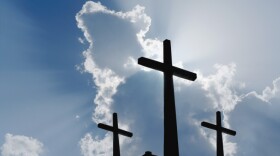
Barbara Bradley Hagerty
Barbara Bradley Hagerty is the religion correspondent for NPR, reporting on the intersection of faith and politics, law, science and culture. Her New York Times best-selling book, "Fingerprints of God: The Search for the Science of Spirituality," was published by Riverhead/Penguin Group in May 2009. Among others, Barb has received the American Women in Radio and Television Award, the Headliners Award and the Religion Newswriters Association Award for radio reporting.
Before covering the religion beat, Barb was NPR's Justice Department correspondent between 1998 and 2003. Her billet included the impeachment proceedings against President Clinton, Florida's disputed 2000 election, terrorism, crime, espionage, wrongful convictions and the occasional serial killer. Barbara was the lead correspondent covering the investigation into the September 11 attacks. Her reporting was part of NPR's coverage that earned the network the 2001 George Foster Peabody and Overseas Press Club awards. She has appeared on the PBS programs Washington Week and The NewsHour with Jim Lehrer.
Barb came to NPR in 1995, after attending Yale Law School on a one-year Knight Fellowship. From 1982-1993, she worked at The Christian Science Monitor as a newspaper reporter in Washington, as the Asia correspondent based in Tokyo for World Monitor (the Monitor's nightly television program on the Discovery Cable Channel) and finally as senior Washington correspondent for Monitor Radio.
Barb was graduated magna cum laude from Williams College in 1981 with a degree in economics, and has a masters in legal studies from Yale Law School.
-
Monsignor William Lynn of Philadelphia is the first cleric to be criminally charged with covering up child sex abuse by a priest. Jury selection begins Feb. 21 in a case that will set enormous precedent for future sex abuse litigation.
-
Some Catholics believe the president's new rule on contraceptive coverage resolves religious liberty concerns. But others, including key bishops, say it is smoke and mirrors.
-
The White House and American Catholic bishops are at a stalemate over a rule requiring many religious organizations to provide insurance coverage for contraception. "If the argument is over religious liberty," says one scholar, "the bishops win. If the argument is over contraceptives, the administration wins."
-
Many have turned to YouTube to express their views about the message of Jesus. At least one has reached biblical proportions. With more than 18 million views, "Why I Hate Religion, But Love Jesus" has become a sensation.
-
More than 150 evangelical leaders will gather at a Texas ranch Friday and Saturday to try to coalesce behind a single Republican presidential candidate. But with the primaries and caucuses under way and Mitt Romney in command, their decision may be too little, too late.
-
Americans' religious liberties are under attack — or at least that's what some conservatives say. But the story is much more complicated than either side makes out.
-
Like many adult converts, Gingrich was drawn by the philosophical richness of the Roman Catholic Church. In 2010, Newt and Callista Gingrich produced a documentary about Pope John Paul II's historic trip to Poland. But for Gingrich, the turning point was Pope Benedict XVI's "joyful and radiating presence" on a visit to the US in 2008.
-
In 2011, hell was a hot topic, from Hollywood to doomsday prophets, and especially for best-selling books. Evangelical preacher Rob Bell wrote Love Wins, which takes aim at the fundamental evangelical belief that non-Christians go to hell. Bell's book spawned a bevy of new books on hell.
-
On Monday, the Vatican declared a boy's recovery from a flesh-eating bacterium a miracle, brought about by Kateri Tekakwitha, a Native American woman who lived 350 years ago and was beatified by the church. The declaration means she is likely to become the first Native American saint.
-
Christopher Hitchens, the author and essayist who died on Thursday, was known for his assertive atheism. From scathing books about Mother Teresa and God, to the way his final days played out as a debate over the harm or benefit of prayer, his most lasting legacy may be his duel with religion.










